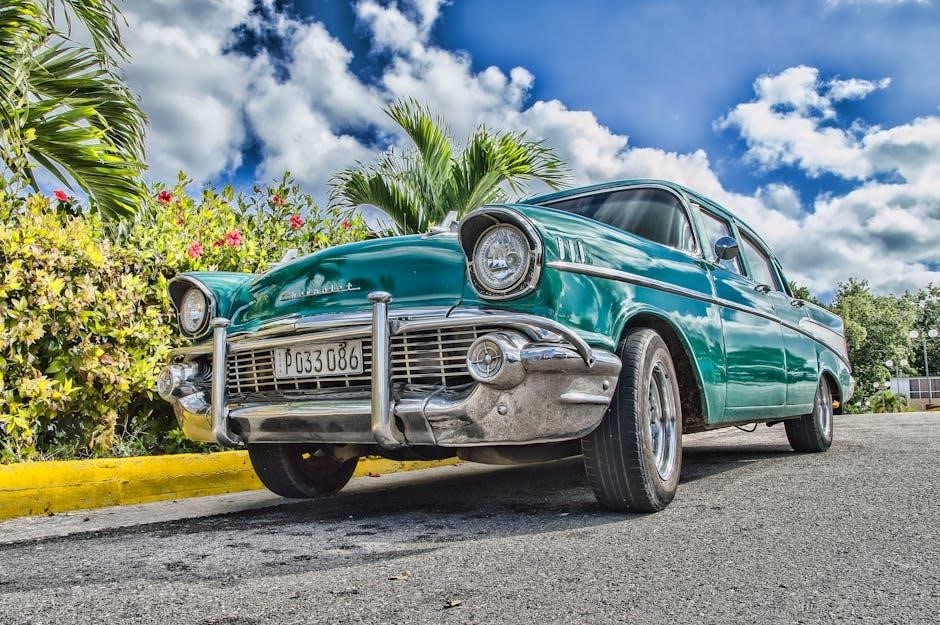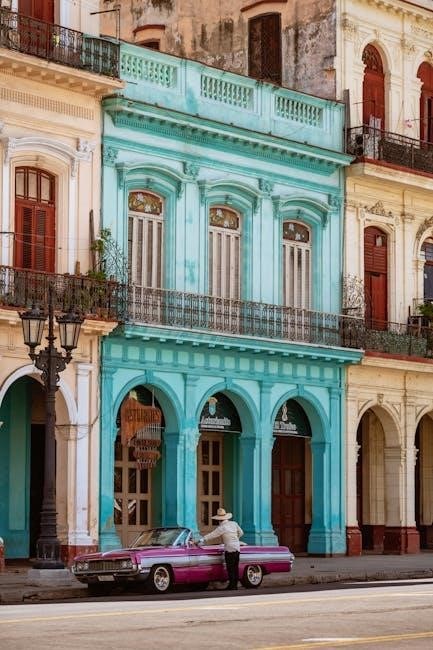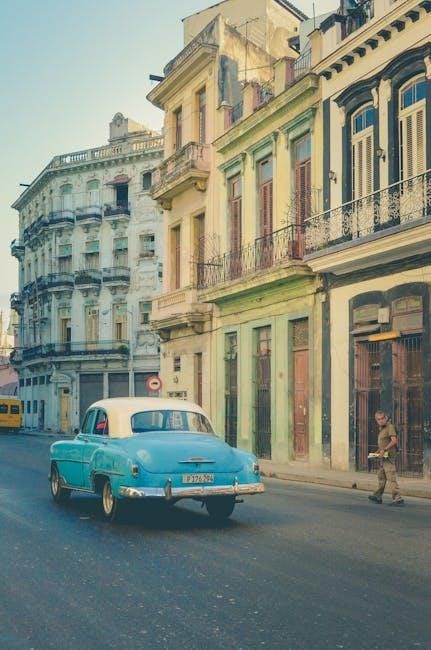Cuban Customs Regulations 2024 outline updated norms for imports, exports, and traveler allowances, ensuring compliance and ease of understanding through digital tools and official resources.
Overview of Key Changes in 2024
The 2024 updates to Cuba’s customs regulations, outlined in Resolution 105/2024, introduce significant changes to import and export norms. These include revised limits on non-commercial imports, stricter controls on electronic appliances, and enhanced digital tools for compliance. The “Normas Aduaneras de Cuba” app now features a baggage simulator and item finder to simplify pre-travel planning. These updates aim to streamline processes while ensuring adherence to regulations, benefiting both travelers and importers.
Importance of Understanding Customs Norms for Travelers and Importers
Importance of Understanding Customs Norms for Travelers and Importers
Understanding Cuba’s customs norms is crucial for travelers and importers to avoid penalties and ensure smooth transactions. Compliance with updated regulations prevents delays, fines, or confiscation of items. Digital tools like the “Normas Aduaneras de Cuba” app provide guidance, helping users verify limits and restrictions. Awareness of these norms facilitates legal imports and exports, safeguarding both personal and commercial interests while adhering to Cuban legal standards.
Legal Framework of Cuban Customs Regulations
Cuba’s customs regulations are governed by key resolutions, including Resolution 105/2024 and prior ones like 206 and 207 of 2014, ensuring legal compliance and procedural clarity.
Resolution 105/2024 and Its Implications
Resolution 105/2024 updates Cuba’s customs regulations, clarifying non-commercial import limits and restrictions on certain items. It also introduces digital tools like the “Normas Aduaneras de Cuba” app, featuring a baggage simulator and item finder to facilitate compliance. This resolution aims to modernize customs procedures, ensuring transparency and efficiency for travelers and importers. It also reinforces the General Customs of the Republic of Cuba’s role in maintaining secure and regulated borders, aligning with global standards for trade and travel.
Relevant Resolutions from Previous Years (e.g., Resolutions 206 and 207 of 2014)
Resolutions 206 and 207 of 2014 established foundational rules for customs procedures in Cuba, focusing on non-commercial imports and export controls. These resolutions set limits on quantities and values for imported items, ensuring compliance with national regulations. They also introduced guidelines for travelers, clarifying permissible goods and quantities. The “Normas Aduaneras de Cuba” app summarizes these resolutions, aiding travelers in understanding restrictions. These earlier resolutions remain influential, shaping current customs practices and updates in 2024.
Import and Export Regulations in Cuba
Cuba’s import and export regulations outline specific limits for non-commercial goods, restricting quantities and values. Exporting Cuban currency is also subject to strict controls, ensuring compliance with national laws.
Non-Commercial Import Limits and Restrictions
Cuba’s customs regulations impose strict limits on non-commercial imports, requiring items to be varied and not exceed specified value thresholds. Electrodomestic appliances are restricted to two units per type, with total values adhering to established limits. These rules ensure fair trade practices and prevent commercial activity under the guise of personal imports. Violations may result in penalties, emphasizing the importance of compliance with these norms to avoid complications during customs clearance.
Special Provisions for Exporting Cuban Currency
Resolution 79-2022 updates regulations for exporting Cuban currency, allowing individuals to export up to 200 Cuban Pesos (CUP) per trip. This provision applies to natural persons, ensuring compliance with legal standards. Exceeding this limit may result in legal consequences. The measure aims to regulate currency movement while facilitating travel and trade. Proper declaration and adherence to these norms are essential to avoid penalties and ensure smooth customs processing for travelers.

Prohibited and Restricted Items
Cuba prohibits importing weapons, narcotics, and counterfeit goods. Restricted items include certain electronics and appliances, with limits on quantities and values to ensure compliance with customs regulations.
Items Banned for Import or Export
Cuba strictly prohibits the import or export of weapons, narcotics, and counterfeit goods. Additionally, certain electronics and appliances are restricted, with specific limits on quantities and values. The customs authorities enforce these bans to protect national security, public health, and intellectual property rights. Travelers must declare all items accurately to avoid penalties. Resolution 105/2024 and earlier resolutions, such as 206 and 207 of 2014, provide detailed lists of prohibited items, ensuring compliance with Cuban legal standards.
Restrictions on Electrodomestic Appliances and Electronics
Cuba imposes strict limits on importing electrodomestic appliances and electronics. Travelers are allowed up to two items of the same type, provided their combined value does not exceed established limits for luggage or shipments. These restrictions aim to regulate trade and prevent unauthorized commercial activity. The “Normas Aduaneras de Cuba” app provides a baggage simulator to verify allowed quantities and avoid penalties, ensuring compliance with Resolution 105/2024 and previous regulations like Resolutions 206 and 207 of 2014.

Digital Tools for Compliance
The “Normas Aduaneras de Cuba” app offers a baggage simulator and item finder, helping travelers comply with customs rules and avoid penalties through accurate checks and updates.
The “Normas Aduaneras de Cuba” App
The “Normas Aduaneras de Cuba” app simplifies compliance with customs rules by providing easy access to resolutions like 206 and 207 of 2014. It features a baggage simulator to check item quantities and prices, avoiding direct searches through lengthy legal texts. The app also includes a news section, contact directory, and item finder to ensure travelers are well-informed. Updated regularly, it helps users navigate import/export limits and avoid penalties, making it an essential tool for anyone traveling to or doing business in Cuba.
Baggage Simulator and Item Finder Features
The app’s Baggage Simulator and Item Finder simplify pre-trip planning by allowing users to check if items comply with customs rules. Travelers can input details like item type, quantity, and value to verify limits and avoid penalties. The simulator provides real-time compliance checks, while the Item Finder offers quick access to specific item regulations. These tools ensure travelers understand restrictions before arriving in Cuba, minimizing delays and ensuring smooth customs processing.

Payment of Duties and Taxes
Cuban customs regulations outline a clear tariff structure for duties, with calculations based on item type, value, and quantity. Certain exemptions apply for special cases.
Tariff Structure for Customs Services
The tariff structure for Cuban customs services is based on the type, value, and quantity of imported or exported goods. According to Resolution 105/2024, duties are calculated using a percentage of the item’s value, with specific rates for commercial and non-commercial imports. Electronics, for example, incur higher tariffs, while essential goods may qualify for reduced rates. Exemptions exist for certain items, such as personal effects under a specified value. Proper declaration is crucial to avoid additional penalties and ensure compliance with regulations.
Exemptions and Special Cases
Certain items, such as personal effects and used goods, are exempt from duties if their value does not exceed specified limits. Humanitarian donations, educational materials, and goods for cultural purposes may also qualify for exemptions. Additionally, Cuban customs regulations allow duty-free importation of specific items for students, professionals, and individuals with special needs, provided they meet established criteria. Cultural artifacts and artwork require prior approval but may be exempt under certain conditions.
Enforcement and Penalties
Cuban customs strictly enforce regulations, imposing fines and confiscation for non-compliance with import/export rules. Accurate declaration of goods is crucial to avoid penalties and ensure smooth processing.
Customs Inspections and Controls
Cuban customs performs rigorous inspections of all goods, utilizing advanced technologies such as X-ray machines and canine units to detect prohibited or undeclared items. Authorities thoroughly examine baggage and shipments, cross-referencing declarations with actual contents. Detailed documentation, including invoices and receipts, is required to verify compliance with import/export regulations. These controls ensure adherence to legal standards, preventing smuggling and enforcing penalties for violations, while safeguarding national security and economic interests.
Consequences of Non-Compliance
Non-compliance with Cuban customs regulations results in penalties, including confiscation of goods, fines, and potential legal action. Fines are determined based on the severity of the violation, with higher penalties for undeclared or prohibited items. Repeat offenses may lead to loss of import/export privileges. Authorities emphasize strict enforcement to ensure adherence to norms, making compliance essential to avoid legal and financial repercussions.

Contact Information and Resources
Reach Cuban Customs via phone (855-5466 al 71, ext. 2 or 881-9732 in Havana) or social media (@AduanaCuba). Office hours: Monday-Friday, 8:30 AM-4:00 PM.
Official Contact Channels (Phone, Email, Social Media)
- Phone: 855-5466 al 71, ext. 2 or 881-9732 (Havana office)
- Email: Available through the official website or via social media platforms
- Social Media: Follow @AduanaCuba on Facebook and Twitter for updates and inquiries
- Office Hours: Monday-Friday, 8:30 AM-4:00 PM (Havana time)
For further assistance, visit the official Cuban Customs website or contact their support team directly.
Downloadable PDF Resources and Guides
The General Customs of the Republic of Cuba offers downloadable PDF resources, including the official Valuation List for Non-Commercial Imports and General Notes for Interpretation. These documents provide detailed guidelines on import limits, restricted items, and customs procedures. Additionally, Resolution 105/2024 and the updated Tariff Structure for Customs Services are available for download. Visit the official Cuban Customs website to access these essential resources and ensure compliance with the latest regulations.
Cuban Customs Regulations 2024, supported by digital tools like the “Normas Aduaneras de Cuba” app, ensure a smooth and compliant experience for travelers and importers.
Final Tips for Navigating Cuban Customs in 2024
To ensure a smooth experience, verify item allowances using the “Normas Aduaneras de Cuba” app, avoid prohibited items, and declare all goods. Stay informed about updates via official channels like the Aduana de Cuba social media and website. Plan ahead, as non-compliance can lead to penalties. Utilize the baggage simulator tool to check limits and exemptions. Always carry receipts for purchased items and familiarize yourself with tariff structures. Stay compliant to avoid delays or fines during your journey to Cuba.
Future Updates and Expected Changes
Stay informed about upcoming changes to Cuban customs regulations through official channels like the Aduana de Cuba website and social media. Future updates may include adjustments to import limits, new digital tools, and enhanced enforcement measures. The Cuban customs authority is expected to continue streamlining processes while maintaining strict controls on prohibited and restricted items. Regularly check for resolution updates and tariff adjustments to ensure compliance during your travels or import activities in 2024 and beyond.
